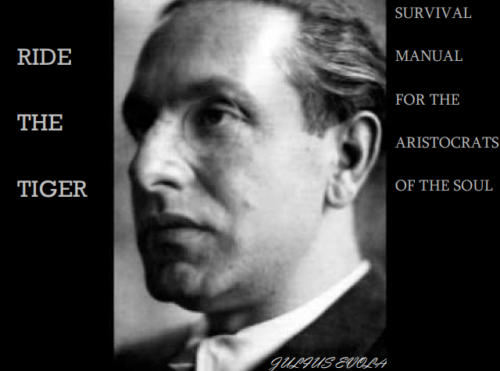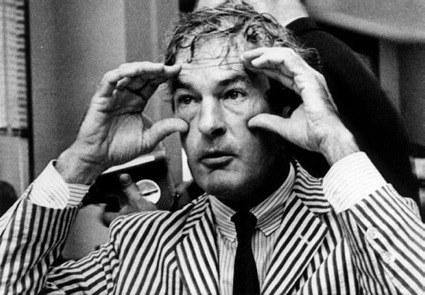
This reading continues on from here.
Part Seven of Ride the Tiger is called ‘Dissolution in the Social Realm’. This consists of four essays. The first of these is called ‘States and Societies – Apoliteia’. In this essay, Evola contends that the sociopolitical environment has essentially collapsed, and that the right sort of person must learn to govern themselves in the absence of social guidance. This is because there are no longer any legitimate nation-states.
True leaders, Evola states, do not exist today. Neither does any movement exist that offers itself as a defender of higher ideas. The petty politicians of today are just figureheads “at the service of financial, industrial,
or corporate interests” – essentially prostitutes. Even if a party that reflected a higher truth appeared, the people are simply too base to voted for one. The only realms left for political action are the irrational and the subintellectual.
Apoliteia means detachment from the political. Evola notes that the great conflict between Western democratic capitalism and Eastern socialism requires no appeal to any higher ideal. The West is equally as destructive and nihilistic as the Marxists. However, the West does at least offer the freedom from where an assault can be mounted. The really difficult thing is to defend one’s dignity when one feels that one belongs to a different humanity.
Essay 26 is called ‘Society – the Crisis of Patriotic Feeling’. Evola immediately lays out the problem – “eνery organic unity has been dissolνed or is dissolνing: caste, stock, nation, homeland, and eνen the family”. The associations of today are not built on blood or ideals or anything meaningful – people only come together temporarily for economic advantage. Spiritual superiority counts for nothing. The problem can be summed up by Nietzsche: a great struggle just to win nothing. Modern states are so bloated and overreaching that they have destroyed all remaining organic bonds.
Curiously, even for writing in the 1960s, Evola can already criticise an “economy of excess” that no longer serves to meet necessities. Evola is able to deduce that overproduction has become normalised – people’s wants simply increased to meet the increase in production. Moreover, the desperate need to employ everyone has people working to produce things that no-one needs.
The modern world is absurd. Our massively increasing population is an insanity, and serves as proof that man, for all of the impulses he has overcome in his conquest of the Earth, cannot control his sexual urges. This population growth has led to the need to condition people more and more in order to force them into the workplace. The overall effect is much like a cancer. No really aristocratic soul could possibly identify with a modern world so base.
Men of our age respond even less to the old appeals for action. Appeals to religion died with World War I; appeals to the nation died with World War II. The traditional state won its power through appeals to order. It was a matter of unification from above, not below. The void can be filled if the ancient principles returned. What is needed is an invisible unity of individuals associated by their nature.
The 27th essay is called ‘Marriage and the Family’. Here Evola contends that we have to face up to the fact that the family no longer has the same meaning and importance as it once did. The essential thing is the transmission of spiritual truth from generation to generation, not merely passing on the bloodline. This loss of meaning in the idea of family combines with the trend of materialism to create misery.
Marriage is now “little more than a puritanical veneer for a regime of high prostitution”. The marriage rites that supposedly made the profane into something sacred have merely served to do the opposite. Part of the problem is that sex is seen as something sinful, which means that marriage itself is something that one only chooses to participate in because one does not want to be an ascetic.
As it is, there is no longer anything worth defending or preserving. Therefore the differentiated man cannot ready form social bonds such as marriage. He must have his own self. Part of the reason for this is, again, that if a true leader arose in today’s time, he would be the last of men to be followed. More important than ensuring a succession of blood is ensuring a succession of spiritual knowledge.
*
If you enjoyed reading this essay, you can get a compilation of the Best VJMP Essays and Articles of 2017 from Amazon for Kindle or Amazon for CreateSpace (for international readers), or TradeMe (for Kiwis).



